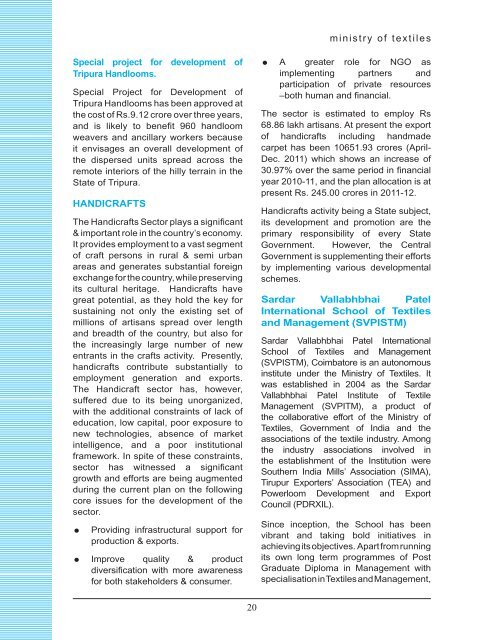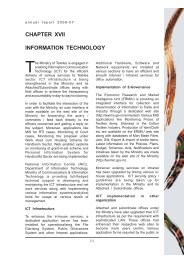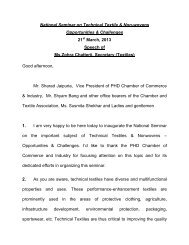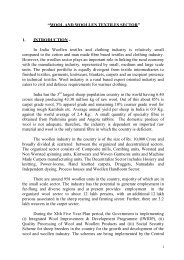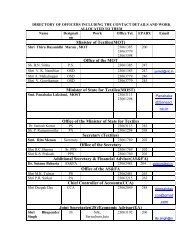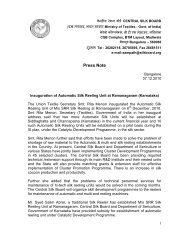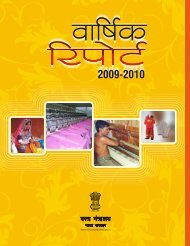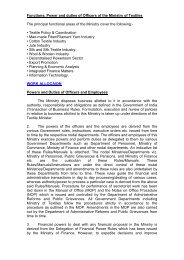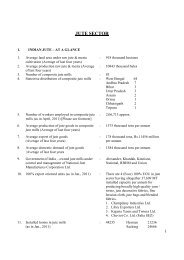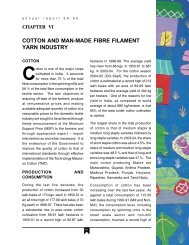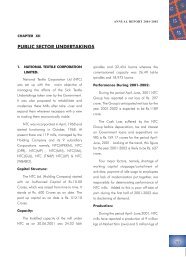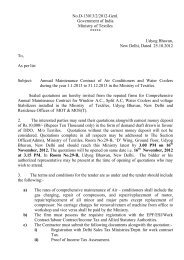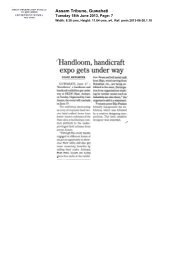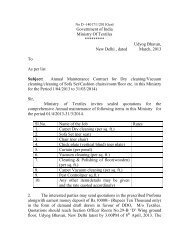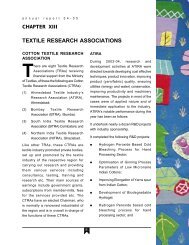chapter viii wool & wollen textiles industry - Ministry of Textiles
chapter viii wool & wollen textiles industry - Ministry of Textiles
chapter viii wool & wollen textiles industry - Ministry of Textiles
You also want an ePaper? Increase the reach of your titles
YUMPU automatically turns print PDFs into web optimized ePapers that Google loves.
ministry <strong>of</strong> <strong>textiles</strong><br />
Special project for development <strong>of</strong><br />
Tripura Handlooms.<br />
Special Project for Development <strong>of</strong><br />
Tripura Handlooms has been approved at<br />
the cost <strong>of</strong> Rs.9.12 crore over three years,<br />
and is likely to benefit 960 handloom<br />
weavers and ancillary workers because<br />
it envisages an overall development <strong>of</strong><br />
the dispersed units spread across the<br />
remote interiors <strong>of</strong> the hilly terrain in the<br />
State <strong>of</strong> Tripura.<br />
HANDICRAFTS<br />
The Handicrafts Sector plays a significant<br />
& important role in the country’s economy.<br />
It provides employment to a vast segment<br />
<strong>of</strong> craft persons in rural & semi urban<br />
areas and generates substantial foreign<br />
exchange for the country, while preserving<br />
its cultural heritage. Handicrafts have<br />
great potential, as they hold the key for<br />
sustaining not only the existing set <strong>of</strong><br />
millions <strong>of</strong> artisans spread over length<br />
and breadth <strong>of</strong> the country, but also for<br />
the increasingly large number <strong>of</strong> new<br />
entrants in the crafts activity. Presently,<br />
handicrafts contribute substantially to<br />
employment generation and exports.<br />
The Handicraft sector has, however,<br />
suffered due to its being unorganized,<br />
with the additional constraints <strong>of</strong> lack <strong>of</strong><br />
education, low capital, poor exposure to<br />
new technologies, absence <strong>of</strong> market<br />
intelligence, and a poor institutional<br />
framework. In spite <strong>of</strong> these constraints,<br />
sector has witnessed a significant<br />
growth and efforts are being augmented<br />
during the current plan on the following<br />
core issues for the development <strong>of</strong> the<br />
sector.<br />
= Providing infrastructural support for<br />
production & exports.<br />
= Improve quality & product<br />
diversification with more awareness<br />
for both stakeholders & consumer.<br />
= A greater role for NGO as<br />
implementing partners and<br />
participation <strong>of</strong> private resources<br />
–both human and financial.<br />
The sector is estimated to employ Rs<br />
68.86 lakh artisans. At present the export<br />
<strong>of</strong> handicrafts including handmade<br />
carpet has been 10651.93 crores (April-<br />
Dec. 2011) which shows an increase <strong>of</strong><br />
30.97% over the same period in financial<br />
year 2010-11, and the plan allocation is at<br />
present Rs. 245.00 crores in 2011-12.<br />
Handicrafts activity being a State subject,<br />
its development and promotion are the<br />
primary responsibility <strong>of</strong> every State<br />
Government. However, the Central<br />
Government is supplementing their efforts<br />
by implementing various developmental<br />
schemes.<br />
Sardar Vallabhbhai Patel<br />
International School <strong>of</strong> <strong>Textiles</strong><br />
and Management (SVPISTM)<br />
Sardar Vallabhbhai Patel International<br />
School <strong>of</strong> <strong>Textiles</strong> and Management<br />
(SVPISTM), Coimbatore is an autonomous<br />
institute under the <strong>Ministry</strong> <strong>of</strong> <strong>Textiles</strong>. It<br />
was established in 2004 as the Sardar<br />
Vallabhbhai Patel Institute <strong>of</strong> Textile<br />
Management (SVPITM), a product <strong>of</strong><br />
the collaborative effort <strong>of</strong> the <strong>Ministry</strong> <strong>of</strong><br />
<strong>Textiles</strong>, Government <strong>of</strong> India and the<br />
associations <strong>of</strong> the textile <strong>industry</strong>. Among<br />
the <strong>industry</strong> associations involved in<br />
the establishment <strong>of</strong> the Institution were<br />
Southern India Mills’ Association (SIMA),<br />
Tirupur Exporters’ Association (TEA) and<br />
Powerloom Development and Export<br />
Council (PDRXIL).<br />
Since inception, the School has been<br />
vibrant and taking bold initiatives in<br />
achieving its objectives. Apart from running<br />
its own long term programmes <strong>of</strong> Post<br />
Graduate Diploma in Management with<br />
specialisation in <strong>Textiles</strong> and Management,<br />
20


